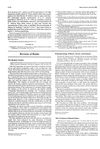69 citations,
December 2015 in “BMC plant biology” Three genes in Arabidopsis are important for plant growth and development by affecting sugar attachment to proteins.
 1 citations,
December 2022 in “BMC Plant Biology”
1 citations,
December 2022 in “BMC Plant Biology” The black orchid Brasiliorchis schunkeana produces chemicals that attract certain insects and have potential antimicrobial properties.

Thermal spring waters and their microbes could be good for skin health and treating some skin conditions in skincare products.
181 citations,
December 2017 in “Trends in immunology” Intestinal intraepithelial lymphocytes are crucial for gut immunity and maintaining the mucosal barrier.
30 citations,
September 2016 in “Aging Cell” Low selenium levels can extend lifespan but worsen health issues.
 4 citations,
October 2022 in “Microbial Cell Factories”
4 citations,
October 2022 in “Microbial Cell Factories” Certain bacteria from the Citrullus colocynthis plant may be a new source of antibiotics to fight drug-resistant diseases.
 10 citations,
March 2022 in “Communications biology”
10 citations,
March 2022 in “Communications biology” A new non-invasive method can analyze skin mRNA to understand skin diseases better.
 58 citations,
December 2020 in “Mayo Clinic Proceedings”
58 citations,
December 2020 in “Mayo Clinic Proceedings” The conclusion is that individual differences in COVID-19 severity are influenced by factors like age, sex, race, and genetics, which are important for personalized medicine.
 9 citations,
August 2021 in “Biological Chemistry”
9 citations,
August 2021 in “Biological Chemistry” ECM-inspired wound dressings can help heal chronic wounds by controlling macrophage activity.

L-PGDS has specific binding sites for its functions and could help in drug delivery system design.
 November 2016 in “Elsevier eBooks”
November 2016 in “Elsevier eBooks” Genetic mutations can affect female sexual development, requiring personalized medical care.
 42 citations,
January 2018 in “Expert review of precision medicine and drug development”
42 citations,
January 2018 in “Expert review of precision medicine and drug development” Drug repositioning is becoming more targeted and efficient with new technologies, offering personalized treatment options and growing interest in the field.
47 citations,
August 2016 in “American Journal Of Pathology” Fibroblast changes in systemic sclerosis may help understand disease severity and treatment.
 20 citations,
August 2022 in “Frontiers in Immunology”
20 citations,
August 2022 in “Frontiers in Immunology” Fibroblasts are important in healing diabetic wounds, but high sugar levels can harm their function and slow down the healing process.
 August 2022 in “Metabolites”
August 2022 in “Metabolites” Different types of skin on mice have unique chemical profiles related to how they grow and react to stress.
 January 2025 in “HORMONES”
January 2025 in “HORMONES” Gender-affirming hormone treatments need better patient-focused outcome measurements and standardized data collection.
 July 2023 in “bioRxiv (Cold Spring Harbor Laboratory)”
July 2023 in “bioRxiv (Cold Spring Harbor Laboratory)” Chitosan slows root hair growth and causes a buildup of callose at low concentrations, but at high concentrations, it only inhibits growth without callose buildup.
 September 2023 in “Nature communications”
September 2023 in “Nature communications” Alk1 in specific cells is crucial for proper nerve branching and hair function.
43 citations,
December 2017 in “BMC Plant Biology” GmMAX3b gene in soybeans boosts nodulation and affects hormone levels.
 November 2023 in “European medical journal. Dermatology”
November 2023 in “European medical journal. Dermatology” PRP can reduce pain and improve function, but more standardized research is needed.

The books were useful but had some areas needing improvement.
 December 2022 in “Exploratory animal and medical research”
December 2022 in “Exploratory animal and medical research” The study concluded that Acral lick dermatitis is most common in young male Labrador retrievers, often caused by psychological factors, and leads to skin inflammation and stress-related blood changes.

Hair and nails can show hormone changes during puberty in dogs.

Off-label drug use can be risky but sometimes beneficial when standard treatments fail.
 2 citations,
October 2022 in “Frontiers in genetics”
2 citations,
October 2022 in “Frontiers in genetics” Late diagnosis of congenital adrenal hyperplasia can greatly affect physical development, gender identity, and sexual health.
 16 citations,
January 2011 in “Indian Journal of Dermatology”
16 citations,
January 2011 in “Indian Journal of Dermatology” Most patients with cicatricial alopecias face significant psychological and social challenges due to their hair loss.
 1 citations,
January 2020 in “Elsevier eBooks”
1 citations,
January 2020 in “Elsevier eBooks” Forensic medicine is crucial for justice and needs continuous innovation and technology integration.
 January 2017 in “Acta dermato-venereologica”
January 2017 in “Acta dermato-venereologica” The congress showed that psychological therapy can help skin condition patients, social media affects acne stigma, education improves atopic dermatitis, and patient satisfaction in dermatology is high, especially with good doctor engagement.
8 citations,
November 2023 in “Social Science & Medicine” Gendered social factors, not just biology, contribute to sex differences in adverse drug events.
 129 citations,
January 2007 in “Otology & Neurotology”
129 citations,
January 2007 in “Otology & Neurotology” Gene therapy with the Math1 gene helped regenerate balance-related cells and improve balance in mice.























